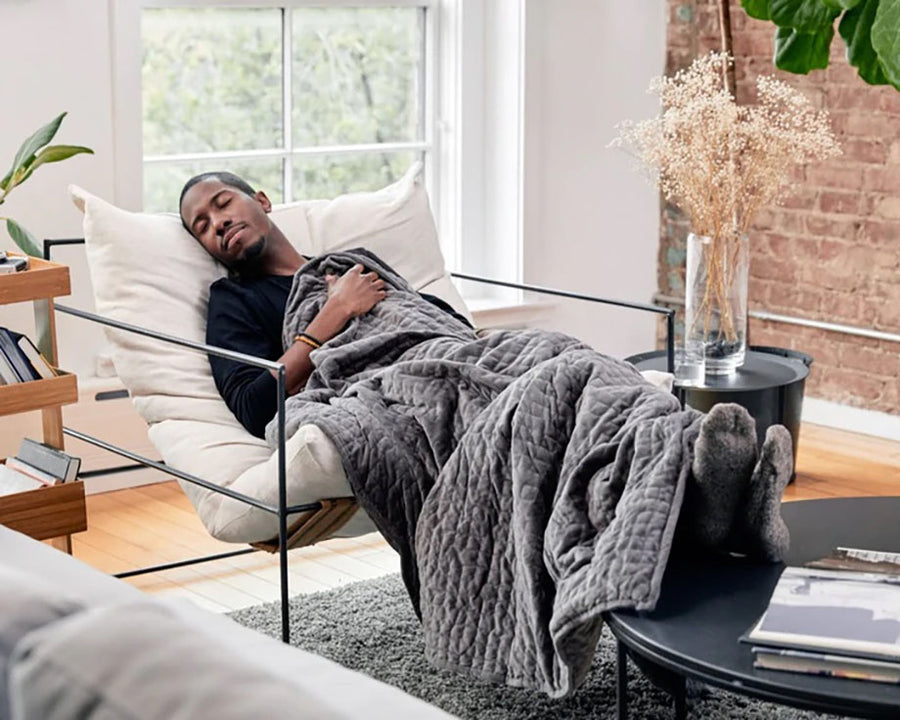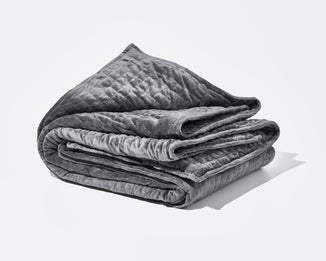
Apr 14, 2022
Can’t Sleep in a New Place? Here’s 4 Helpful Tips
Getting to bed on time is hard enough when you’re in the comfort of your own bed and home. When you're trying to sleep in a new place — be it a new apartment, a dorm room or a vacation rental you've booked for the weekend — getting the recommended amount of shut-eye can seem downright impossible. But take heart! The first night in a new place doesn’t have to be a sleepless one. Read on to find out the evolutionary reason you can’t sleep in a new place and how to get more Zzzs the next time you find yourself sleeping in an unfamiliar setting.

The Reason You Sleep Poorly in Unfamiliar Settings
Having trouble sleeping in a new place is common. So common, in fact, that scientists have a name for it: first-night effect (FNE). This fascinating phenomenon was discovered decades ago when sleep researchers first began studying human sleep in laboratories. Essentially, study participants slept so poorly the first night that researchers simply decided to toss out any data they collected on the first night for fear of invalidating the results.
But why does this phenomenon happen in the first place? According to scientists from Brown University, you can blame it on your brain — specifically, the left hemisphere.
In a study published in Current Biology, researchers used several methods to measure the brain activity of 11 volunteers as they slept for two nights about a week apart. The subjects fell asleep at their normal bedtimes and their brains were scanned for approximately two hours (the length of a normal sleep cycle).
Their results found that slow-wave activity in the right hemisphere of the brain remained consistent on both nights, while slow-wave activity in the left hemisphere was significantly diminished during the first night. This suggests that half of the brain stays more alert during the first night in an unfamiliar setting — part of an evolutionary survival strategy to protect us from predators as we sleep.
What to Do If You Can’t Sleep in a New Place
So, what can you do to relax and sleep better that first night in a new place? Here are a couple of tips and tricks for reducing the first-night effect and getting the snooze you need on the first try.
1. Bring a pillow with you
Hitting the open road or air? Don’t forget to pack your favorite pillow. Your pillow's familiar smell and feel can provide a sense of comfort and may trick your brain into thinking you're still at home, helping you fall into a deeper slumber.

2. Wind down with a weighted blanket
An unfamiliar sleeping environment isn’t the only factor that can hinder your chances of getting a good night’s sleep on the first night. Sleeping in a new place is often accompanied by an exciting or stressful event, such as traveling, moving into a new home or going off to college.
To calm your nighttime jitters, consider winding down at night with a premium-quality weighted blanket. The gentle pressure of the blanket is known to produce a calming effect that reduces stress and prepares your body for sleep.
Are you a hot sleeper? Enjoy a sweat-free slumber with our revolutionary cooling weighted blanket.
Shop Weighted Blankets3. Keep your nighttime routine intact
Abiding by your regular bedtime routine is essential for good sleep no matter where you rest your head at night, but it’s especially important in a new place. When you do the same activities before bed each night, your brain begins to associate these activities with sleep. Therefore, you can help trick your brain into thinking that nothing is different by simply practicing your usual pre-bedtime rituals.

4. Block potential distractions
From creaky floorboards to bright street lamps, a new environment can bring a whole different set of distractions to thwart your sleep. If you want to increase your chances of sleeping soundly on the first night in a new place, try planning ahead for any potential sleep disruptors. If you know you’ll be sleeping in a room without blackout curtains, consider wearing a sleep mask to block out light (bonus points if it’s a weighted eye mask). Are you sensitive to ambient noise? Download a few white noise apps on your phone to drown out unfamiliar sounds that might keep you awake.
Get Your Weighted Eye MaskGetting a great night’s sleep in an unfamiliar environment isn’t easy, but it’s doable. You just need to plan ahead and make your sleeping environment feel as home-like as possible. With a bit of forethought and the right sleep aids, you can set yourself up for a blissful night’s sleep in your new place.
Your use of this website, its content, and any products obtained through this website is at your own risk. This website, its content, and any products obtained through this website are provided on an “as is” basis, without any warranties of any kind, either express or implied, including warranties of merchantability, infringement of intellectual property, or fitness for any particular purposes. No warranty or representation is made with respect to the completeness, reliability, quality, or accuracy of this website or its content. This website, its content, and any products obtained through this website do not constitute medical treatment and is not a substitute for a medical examination or diagnosis. If you are dealing with a health condition check with your health care provider before using. This website may contain affiliate links that allow us to earn a commission on purchases made through such links. We may accept forms of advertising or sponsorships in connection with this website. There might also be paid topic insertions. We may accept and keep free products, services, and other forms of compensation from others.



